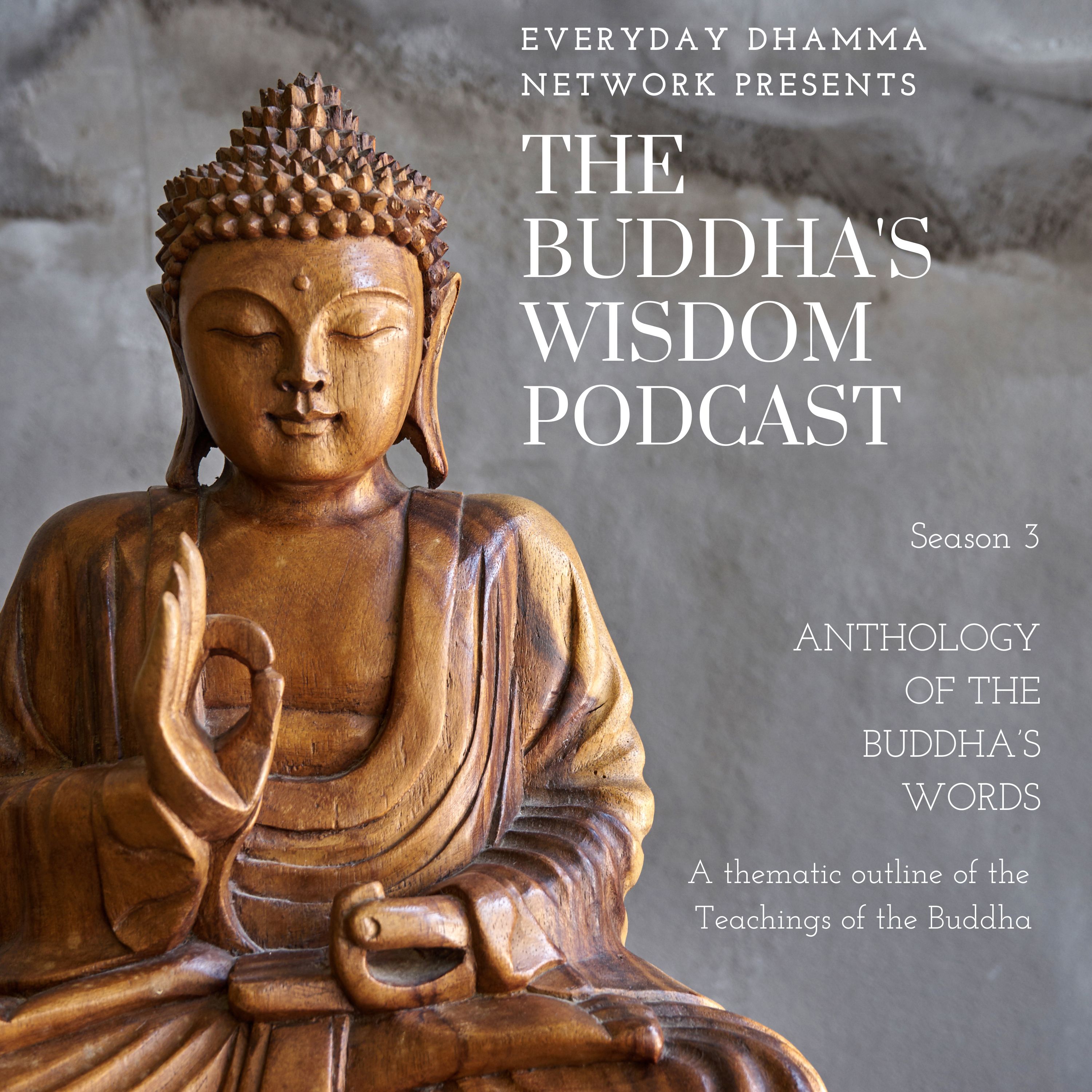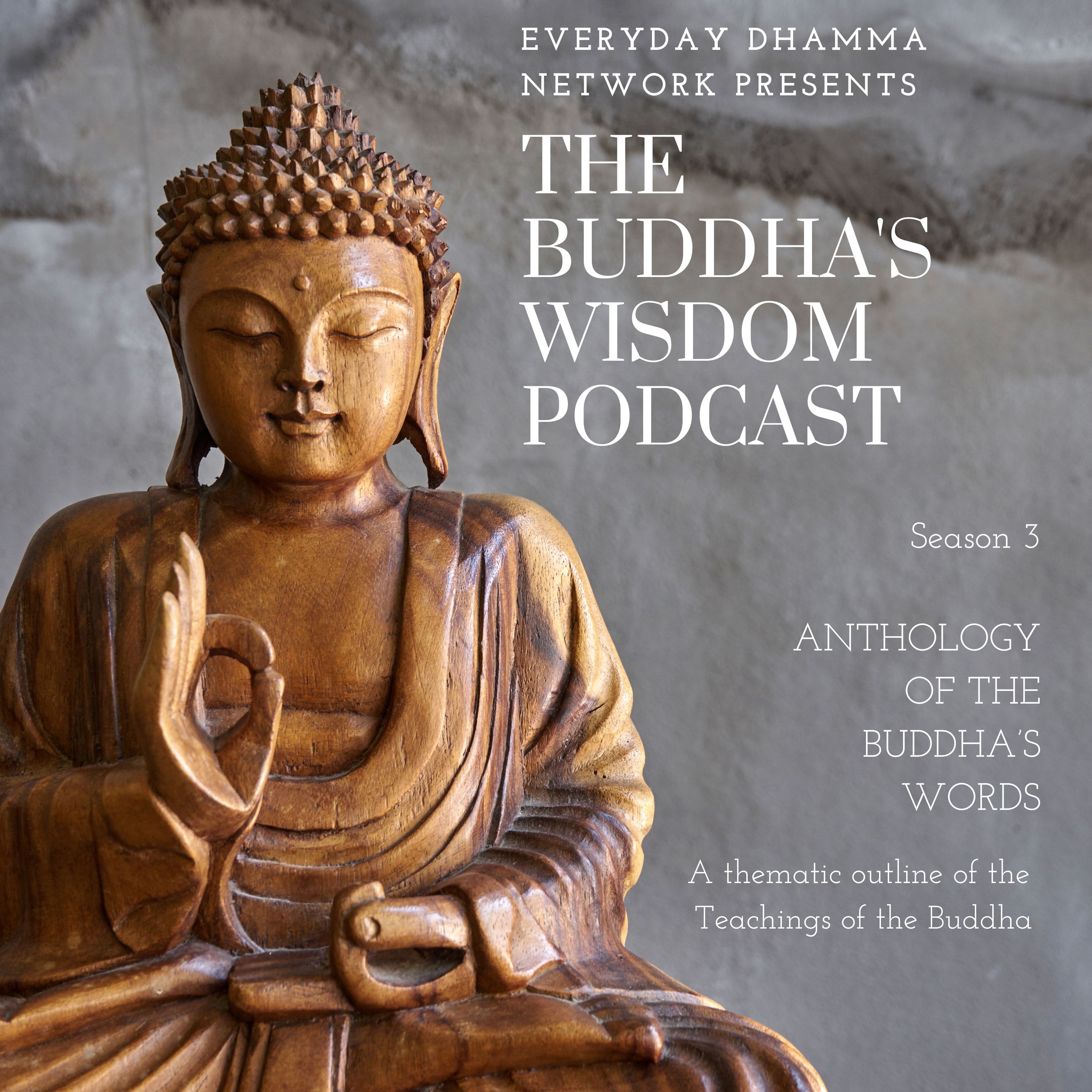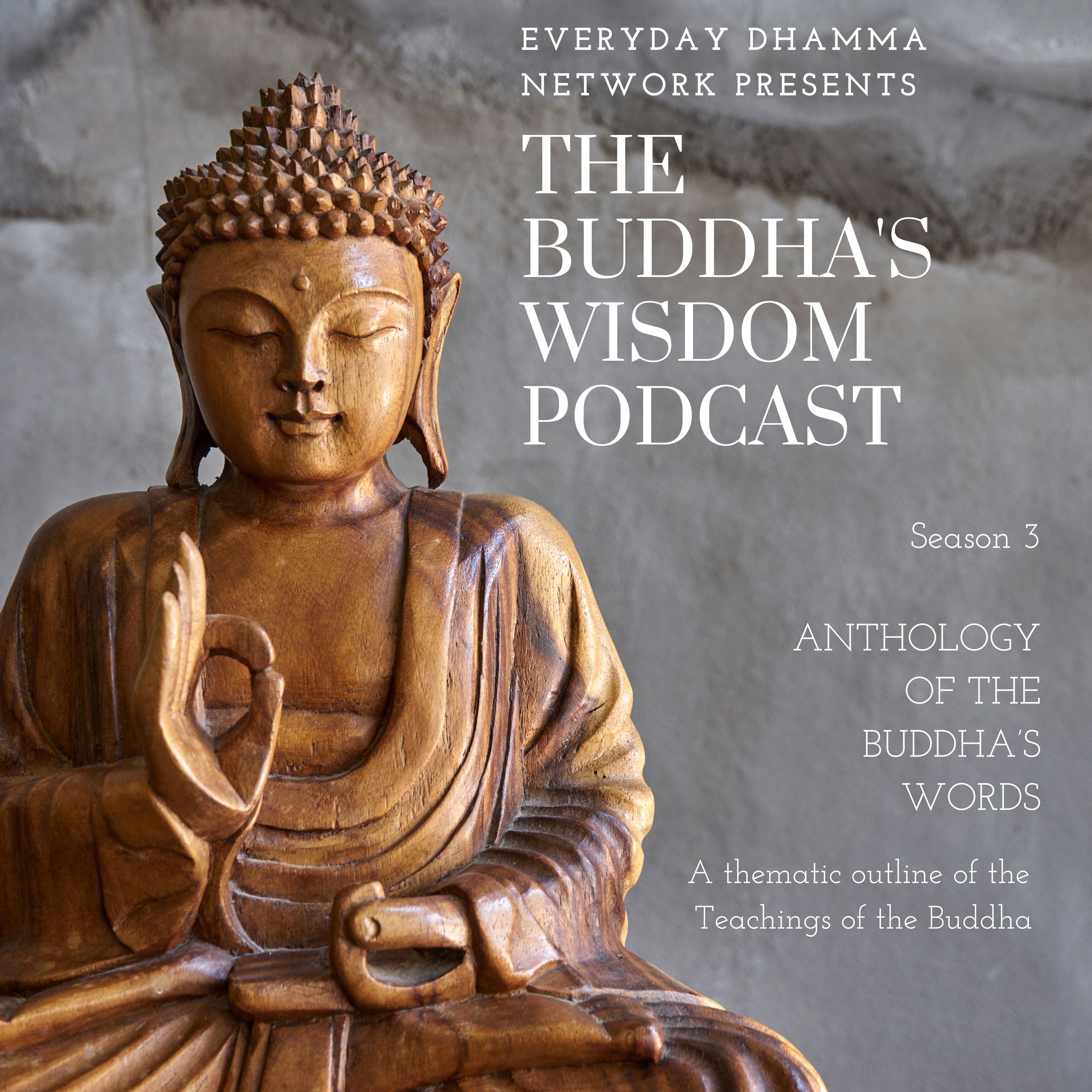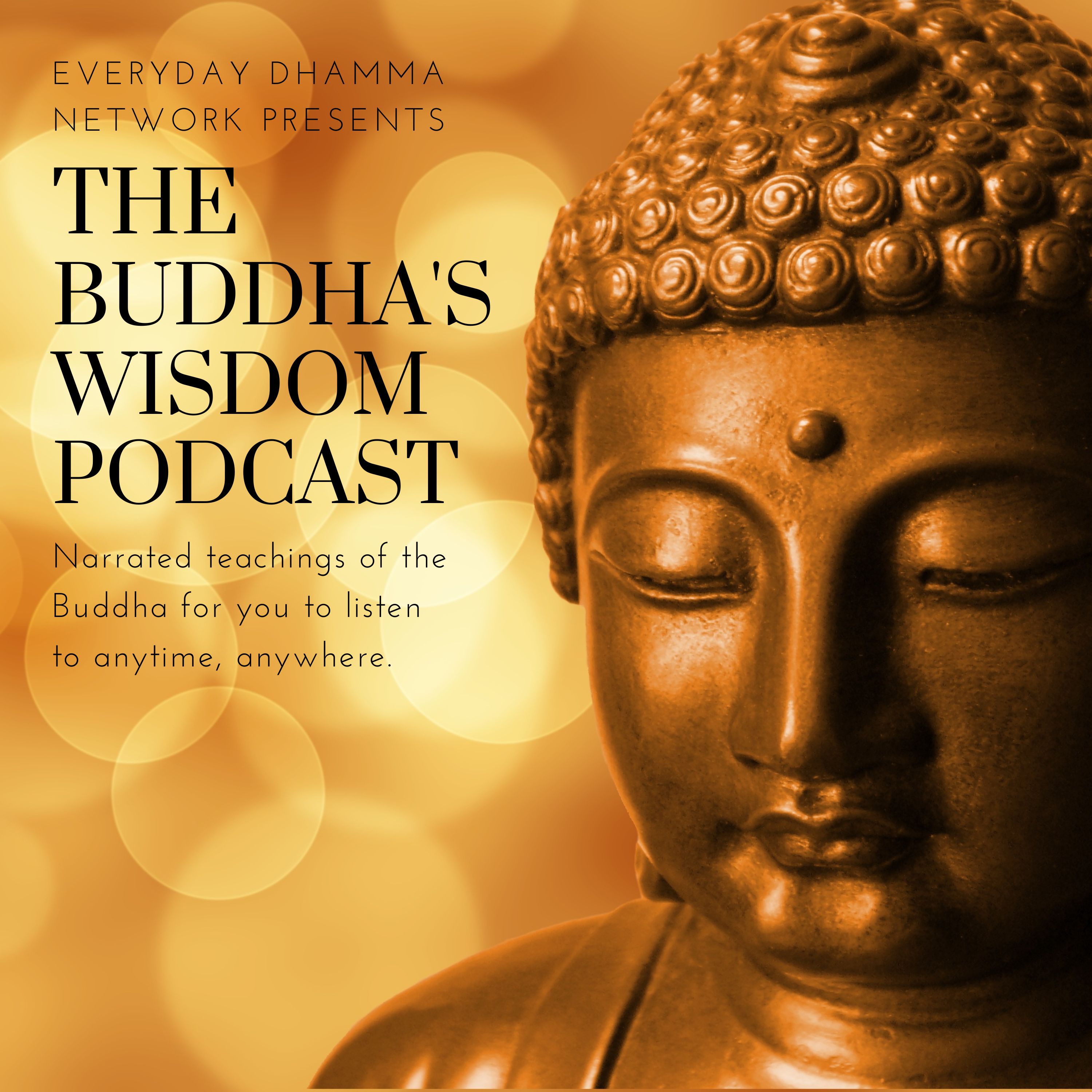Episode Transcript
## Sutta 1 - Upholding the Dhamma in Society
“Mendicants, even a wheel-turning monarch, a just and principled king, does not wield power without having their own king.” When he said this, one of the mendicants asked the Buddha:
“But who is the king of the wheel-turning monarch, the just and principled king?”
“It is principle, monk,” said the Buddha.
“Monk, a wheel-turning monarch provides just protection and security for his court, relying only on principle—honoring, respecting, and venerating principle, having principle as his flag, banner, and authority.
He provides just protection and security for his aristocrats, vassals, troops, brahmins and householders, people of town and country, ascetics and brahmins, beasts and birds. When he has done this, he wields power only in a principled manner. And this power cannot be undermined by any human enemy.
In the same way, monk, a Realized One, a perfected one, a fully awakened Buddha, a just and principled king, provides just protection and security regarding bodily actions, relying only on principle—honoring, respecting, and venerating principle, having principle as his flag, banner, and authority. ‘This kind of bodily action should be cultivated. This kind of bodily action should not be cultivated.’
Furthermore, a Realized One … provides just protection and security regarding verbal actions, saying: ‘This kind of verbal action should be cultivated. This kind of verbal action should not be cultivated.’ … And regarding mental actions: ‘This kind of mental action should be cultivated. This kind of mental action should not be cultivated.’
And when a Realized One, a perfected one, a fully awakened Buddha has provided just protection and security regarding actions of body, speech, and mind, he rolls forth the supreme Wheel of Dhamma. And that wheel cannot be rolled back by any ascetic or brahmin or god or Māra or divinity or by anyone in the world.”
AN 3:14
## Sutta 2 - Worshipping the Six Directions
So I have heard. At one time the Buddha was staying near Rājagaha, in the Bamboo Grove, the squirrels’ feeding ground. Now at that time the householder’s son Sigālaka rose early and left Rājagaha. With his clothes and hair all wet, he raised his joined palms to revere the various quarters—east, south, west, north, below, and above.
Then the Buddha robed up in the morning and, taking his bowl and robe, entered Rājagaha for alms. He saw Sigālaka revering the various quarters and said to him, “Householder’s son, why are you revering the various quarters in this way?”
“Sir, on his deathbed my father said to me: ‘My dear, please revere the quarters.’ Honoring, respecting, and venerating my father’s words, I rose early and left Rājagaha and, with my clothes and hair all wet, raised my joined palms to revere the various quarters—east, south, west, north, below, and above.”
“Householder’s son, that’s not how the six directions should be revered in the training of the Noble One.”
“But sir, how should the six directions be revered in the training of the Noble One? Sir, please teach me this.”
“Well then, householder’s son, listen and apply your mind well, I will speak.”
“Yes, sir,” replied Sigālaka. The Buddha said this:
“And how, householder’s son, does a noble disciple cover the six directions? These six directions should be recognized: parents as the east, tutors as the south, partner and children as the west, friends and colleagues as the north, bondservants and workers as beneath, and ascetics and brahmins as above.
A child should serve their parents as the eastern quarter in five ways, thinking: ‘I will support those who supported me. I’ll do my duty for them. I’ll maintain the family lineage. I’ll take care of the inheritance. When they have passed away, I’ll make an offering on their behalf.’ Parents served by the children in these five ways show sympathy to them in five ways. They keep them from doing bad. They support them in doing good. They train them in a profession. They connect them with a suitable partner. They transfer the inheritance in due time. Parents served by their children in these five ways show sympathy to them in these five ways. And that’s how the eastern quarter is covered, kept safe and free of peril.
A pupil should serve their tutor as the southern quarter in five ways: by rising for them, by serving them, by listening well, by looking after them, and by carefully learning their profession. Tutors served by their pupils in these five ways show sympathy to them in five ways. They make sure they’re well educated and well drilled in memorization. They clearly explain all the knowledge of the profession. They introduce them to their friends and colleagues. They provide protection in every region. Tutors served by their pupils in these five ways show sympathy to them in these five ways. And that’s how the southern quarter is covered, kept safe and free of peril.
A husband should serve his wife as the western quarter in five ways: by treating her with honor, by not looking down on her, by not being unfaithful, by relinquishing authority to her, and by presenting her with adornments. A wife served by her husband in these five ways shows sympathy to him in five ways. She’s well-organized in her work. She manages the domestic help. She’s not unfaithful. She preserves his earnings. She’s deft and tireless in all her duties. A wife served by her husband in these five ways shows sympathy to him in these five ways. And that’s how the western quarter is covered, kept safe and free of peril.
A gentleman should serve his friends and colleagues as the northern quarter in five ways: giving, kindly words, taking care, equality, and not using tricky words. Friends and colleagues served by a gentleman in these five ways show sympathy to him in five ways. They guard him when they’re negligent. They guard his property when they’re negligent. They keep him safe in times of danger. They don’t abandon him in times of trouble. They honor his descendants. Friends and colleagues served by a gentleman in these five ways show sympathy to him in these five ways. And that’s how the northern quarter is covered, kept safe and free of peril.
A master should serve their bondservants and workers as the lower quarter in five ways: by organizing work according to ability, by paying food and wages, by nursing them when sick, by sharing special treats, and by giving time off work. Bondservants and workers served by a master in these five ways show sympathy to him in five ways. They get up first, and go to bed last. They don’t steal. They do their work well. And they promote a good reputation. Bondservants and workers served by a master in these five ways show sympathy to him in these five ways. And that’s how the lower quarter is covered, kept safe and free of peril.
A gentleman should serve ascetics and brahmins as the upper quarter in five ways: by loving deeds of body, speech, and mind, by not turning them away at the gate, and by providing them with material needs. Ascetics and brahmins served by a gentleman in these five ways show sympathy to him in six ways. They keep him from doing bad. They support him in doing good. They think of him with kindly thoughts. They teach him what he does not know. They clarify what he’s already learned. They explain the path to heaven. Ascetics and brahmins served by a gentleman in these five ways show sympathy to him in these six ways. And that’s how the upper quarter is covered, kept safe and free of peril.”
DN 31 Sigalaka Sutta
## Sutta 3 - Respect for Parents
“Mendicants, a family where the children honor their parents in their home is said to live with divinity. A family where the children honor their parents in their home is said to live with the first tutors. A family where the children honor their parents in their home is said to live with the elder gods. A family where the children honor their parents in their home is said to live with those worthy of offerings dedicated to the gods.
‘Divinity’ is a term for your parents.
‘First tutors’ is a term for your parents.
‘Elder gods’ is a term for your parents.
‘Worthy of an offering dedicated to the gods’ is a term for your parents.
Why is that? Parents are very helpful to their children, they raise them, nurture them, and show them the world.
AN 4:63
## Sutta 4 - Repaying One’s Parents
“Mendicants, I say that these two people cannot easily be repaid. What two? Mother and father.
You would not have done enough to repay your mother and father even if you were to carry your mother around on one shoulder and your father on the other, and if you lived like this for a hundred years, and if you were to anoint, massage, bathe, and rub them; and even if they were to defecate and urinate right there.
Even if you were to establish your mother and father as supreme monarchs of this great earth, abounding in the seven treasures, you would still not have done enough to repay them. Why is that? Parents are very helpful to their children: they raise them, nurture them, and show them the world.
But you have done enough, more than enough, to repay them if you encourage, settle, and ground unfaithful parents in faith, unethical parents in ethical conduct, stingy parents in generosity, or ignorant parents in wisdom.”
AN 2:33
## Sutta 5 - Husbands and Wives
At one time the Buddha was traveling along the road between Madhurā and Verañjā, as were several householders, both women and men. The Buddha left the road and sat at the root of a tree, where the householders saw him.
They went up to the Buddha, bowed, and sat down to one side. The Buddha said to them:
“Householders, there are four ways of living together. What four?
1. A male zombie living with a female zombie;
2. a male zombie living with a goddess;
3. a god living with a female zombie;
4. a god living with a goddess.
And how does a male zombie live with a female zombie? It’s when the husband kills living creatures, steals, commits sexual misconduct, lies, and consumes beer, wine, and liquor intoxicants. He’s unethical, of bad character, living at home with his heart full of the stain of stinginess, abusing and insulting ascetics and brahmins. And the wife is also … unethical, of bad character … That’s how a male zombie lives with a female zombie.
And how does a male zombie live with a goddess? It’s when the husband … is unethical, of bad character … But the wife doesn’t kill living creatures, steal, commit sexual misconduct, lie, or consume beer, wine, and liquor intoxicants. She’s ethical, of good character, living at home with her heart rid of the stain of stinginess, not abusing and insulting ascetics and brahmins. That’s how a male zombie lives with a goddess.
And how does a god live with a female zombie? It’s when the husband … is ethical, of good character … But the wife … is unethical, of bad character … That’s how a god lives with a female zombie.
And how does a god live with a goddess? It’s when the husband … is ethical, of good character … And the wife is also … ethical, of good character … That’s how a god lives with a goddess.
AN 4:53
## Sutta 6 - How to be reunited in future lives
So I have heard. At one time the Buddha was staying in the land of the Bhaggas at Crocodile Hill, in the deer park at Bhesakaḷā’s Wood.
Then the Buddha robed up in the morning and, taking his bowl and robe, went to the home of the householder Nakula’s father, where he sat on the seat spread out.
Then the householder Nakula’s father and the housewife Nakula’s mother went up to the Buddha, bowed, and sat down to one side. Nakula’s father said to the Buddha, “Sir, ever since we were both young, and Nakula’s mother was given to me in marriage, I can’t recall betraying her even in thought, still less in deed. We want to see each other in both this life and the next.”
Then Nakula’s mother said to the Buddha, “Sir, ever since we were both young, and I was given in marriage to Nakula’s father, I can’t recall betraying him even in thought, still less in deed. We want to see each other in both this life and the next.”
“Householders, if wife and husband want to see each other in both this life and the next, they should be equals in faith, ethics, generosity, and wisdom.
> When both are faithful and bountiful,disciplined, living righteously,then wife and husband say nice things to each other.
>
>
> Their needs are amply satisfied, so they live at ease.Their enemies are downhearted, when both are equal in ethics.
>
> Having practiced the teaching here, both equal in precepts and observances,they delight in the heavenly realm, enjoying all the pleasures they desire.”
>
AN 4:55
## Sutta 7 - Seven Kinds of Wives
Then the Buddha robed up in the morning and, taking his bowl and robe, went to the home of the householder Anāthapiṇḍika, where he sat on the seat spread out.
Now at that time people in Anāthapiṇḍika’s home were making a dreadful racket. Then the householder Anāthapiṇḍika went up to the Buddha, bowed, and sat down to one side. The Buddha said to him, “Householder, what’s with the people making that dreadful racket in your home? You’d think it was fishermen hauling in a catch!”
“Sir, that’s my daughter-in-law Sujātā. She’s been brought here from a wealthy family. She doesn’t obey her mother-in-law or father-in-law or her husband. And she does not honor, respect, esteem, and venerate the Buddha.”
Then the Buddha addressed Sujātā, saying, “Come, Sujātā.”
“Yes, sir,” she replied. She went up to the Buddha, bowed, and sat down to one side. The Buddha said to her:
“Sujātā, a man can have seven kinds of wife. What seven? A wife like a killer, a wife like a thief, a wife like a lord, a wife like a mother, a wife like a sister, a wife like a comrade, and a wife like a bondservant. These are the kinds of wife that a man can have. Which one of these are you?”
“Sir, I don’t understand the detailed meaning of what the Buddha has said in brief. Please teach me this matter so I can understand the detailed meaning.”
“Well then, Sujātā, listen and apply your mind well, I will speak.”
“Yes, sir,” she replied. The Buddha said this:
> “With a mind full of hate and no kindness,
>
>
> lusting for others, looking down on her husband,
>
> she longs to murder him who paid the price for her.
>
> A man’s wife of this sort
>
> is called a wife and a killer.
>
> A woman’s husband earns his wealth
>
> by focusing on a profession, trade, or farming.
>
> And even if it’s only a little, she wants to take it.
>
> A man’s wife of this sort
>
> is called a wife and a thief.
>
> She’s an idle glutton who doesn’t want to work.
>
> Her words are harsh, fierce, and rude.
>
> She rules over him, though he rises early.
>
> A man’s wife of this sort
>
> is called a wife and a lord.
>
> She’s always caring and kind,
>
> looking after her husband like a mother her child.
>
> She keeps the wealth that he has earned secure.
>
> A man’s wife of this sort
>
> is called a wife and a mother.
>
> She respects her husband
>
> as a younger sister respects her elder.
>
> Conscientious, she does what her husband says.
>
> A man’s wife of this sort
>
> is called a wife and a sister.
>
> She’s delighted to see him,
>
> like one reunited with a long-lost comrade.
>
> She’s of good pedigree, virtuous, and devoted.
>
> A man’s wife of this sort
>
> is called a wife and a comrade.
>
> She has no angerwhen threatened with violence by the rod.
>
> Without hate or anger,
>
> she withstands her husband and does what he says.
>
> A man’s wife of this sort
>
> is called a wife and a bondservant.
>
> The kinds of wives here called
>
> killer, thief, and lord;
>
> immoral, harsh, and lacking regard for others,
>
> when their body breaks up they set course for hell.
>
> But the kinds of wives here called
>
> mother, sister, friend, and bondservant;
>
> steadfast in their own morality,restrained for a long time,
>
> when their body breaks upthey set course for a good place.
>
Sujātā, these are the seven kinds of wife that a man can have. Which one of these are you?”
“Sir, from this day forth may the Buddha remember me as a wife like a bondservant.”
AN 7:63





